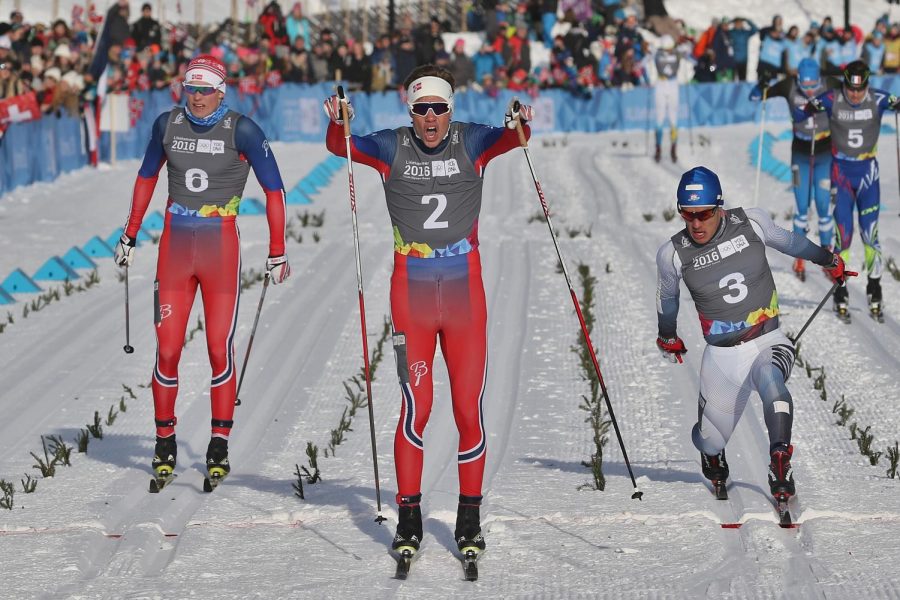Norway Becomes Champion of Winter Olympics with 39 Medals
March 2, 2018
Norway, the tiny Scandinavian country with just over 5 million people, took home 39 Olympic medals from the 2018 Winter Olympic Games, with 14 of those medals being gold. While certain powerhouses in the past Winter Olympics such as Canada, Germany, and the U.S. all fell short of their projected medal counts, Norway — known mostly for vikings, oil, and happiness — surpassed their 37 projected medals and crushed their runner-up, Germany, by eight medals.
Many people wonder how a country so small when compared to the likes of the U.S. could possibly top the medal charts at an international sporting event, much less something as prestigious and well-known as the Olympics. The answer, according to the Norwegians, is simple: snow, tradition, and camaraderie.
As one of the northernmost countries in the world, it is no surprise that Norway is given a massive influx of snow each winter — so much so, in fact, that snow is an integral part of Norwegian culture. The familiarity and love for snow leads to Norwegians getting used to the harsh conditions that snow often brings, allowing them to better cope with and perform in conditions where snow plays a large factor. And according to Tore Ovrebo, the chef de mission for Norway at the Olympics, snow is indeed the secret to the country’s success.
It is Norway’s long history with snow that leads the people of the nation to be incredibly excited when winter comes, for this is when ski season starts. And as most people know, skiing in all its forms — ski jumping, alpine skiing, and cross-country skiing — is a massive part of the Winter Olympic Games, making up one-third of the total number of events. For the Norwegians, this means gold galore.
Skiing, a sport that actually began as a means of travel across frigid and otherwise impassable areas of Scandinavia, has become the most beloved pastime of the Norwegian people. Skiing to Norway is like football to the United States: a part of their culture. This is why most Norwegian children begin skiing at a young age in one of 11,000 sports clubs, and why most of them continue to ski whenever they can throughout their whole lives, providing a large pool of grassroots athletes.
A historical example of Norway’s infatuation with skiing can be seen in 1905, when a son of Denmark’s king, Haakon VII, became monarch over the country after Norway split away from a union with Sweden. He was told by famous Norwegian adventurer Fridtjof Nansen that “he didn’t need to learn the language to win the hearts of the Norwegians; he needed to learn how to ski.” King Haakon ended up taking Nansen’s advice, and only a few short years into his reign, he became beloved by his people.
Norway’s deep, cultural love for skiing was a major part of what allowed them to take home so many medals this Winter Olympics, but it is also what, they are afraid, is killing the sport. Think of it like this: would you want to watch a sport in which your team or your country’s athlete has next to no chance of winning because one country consistently dominates the sport?
The statistics suggest not, as international viewership of skiing events has fallen 40 percent since 2011 when Norway began claiming gold in almost everything ski-related. This is also how many people in other countries feel about basketball since the U.S. so consistently controls the court, and how people look at the Netherlands and their domination of speed skating.
Recently, however, Norway has been attempting to remedy this problem, not by suppressing their own athletes but by attempting to elevate their competitors. For the past seven years, Norway has hosted various week-long camps to teach people from all around the world certain Norwegian skiing techniques, aiming to breathe new life into the sport. What’s more is that Norway, outside of travel expenses, covers all the costs of the camps.
This practice, of course, does not guarantee the success of other countries in skiing competitions, but it proves that efforts are being made to revitalize the sport so beloved in Norway and introduce it more extensively to the rest of the world. And with some of the richest companies and people in the country as benefactors, the Norwegian Ski Federation will likely continue this altruistic practice for quite some time.
One other key factor attributing to Norway’s success in the Winter Olympics is something far easier to attain for other countries than snow or ski culture: friendship and kindness . It is this sense of togetherness that allows Norwegian athletes to operate on a budget of only $19 million for both summer and winter sports, which, when compared to the United States’ budget of $168 million, is nothing to be dismissed.
According to Kjetil Jansrund, a Norwegian skier on the 2018 team, there is “no good explanation for why you have to be a jerk to be a good athlete.” Potential athletes who would rather be rude to their teammates and refuse to attend the taco nights on Fridays with their fellows will find themselves out of luck, for, as Jansrund says, the Norwegians “won’t have that kind of thing on their team.”
Ultimately, Norway is a country that many others could take lessons from both in skiing and other alpine sports, but in breaking the misconception that athletes must be arrogant and rude in order to win as well. And come what may for Norway and for the rest of the world, skiing in all of its forms will remain a pinnacle of Norwegian society and a deeply embedded part of their culture.



